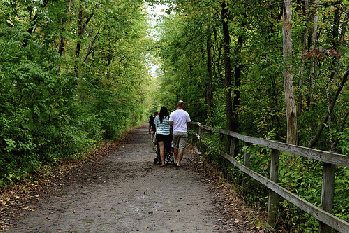L o ve that s l o w speed: 15 Steps
Toward Reducing Energy Use and Hacking Risks While Maintaining Emergency Preparedness (Yup: 15 steps will decrease all three)
by Katie Singer
www.electronicsilentspring.com
1. Get informed about federal telecom rules and regs, including Section 704 of the 1996 Telecom Act, which states that no health or environmental concern may interfere with the placement of cellular antennas.
2. Get wired as much as possible. The second you go wireless, you risk interception, increase your exposure to electromagnetic radiation (EMR), and increase energy use. To ethernet wire your iPad, iPhone or iPod, go to http://ehtrust.org/hardwire-ipad-ipod-iphone
3. Not so fast. Before you upgrade, wait at least three years. Each new device requires manufacturing, which requires mining for coltan and graphite, massive amounts of "pure" water, which require chemicals. Each new device requires infrastructure that requires manufacturing; and exposes people and wildlife to whole-body EMR.
4. Protect your sleep. Until you get wired Internet access, turn your wireless router(s) off for at least 12 hours each night. Unplug (don't just turn off) all electronics in your bedroom while you sleep. If you've got a refrigerator or a digital appliance or a computer on the other side of your bedroom wall, unplug it. (To keep food cool, freeze used plastic bottles with water. Transfer a few frozen bottles to each shelf in the fridge before bedtime.)
5. Think of your mobile phone as a message-taker. Program it to let you know every two hours whether or not you've got a message. (This way, you won't get zapped 24/7; and you'll get more work done, since you won't have to respond to constant messages.) Turn off the bluetooth and Wi-Fi antennas. Keep them off. If you must make a call, keep the phone in speakerphone mode. Do not keep the phone near your head, in your bra or pants pocket.
6. Keep prepared for emergencies. Keep a corded landline telephone as long as possible--since during a power outage, mobile phones and voice over Internet protocols (VOIPs) like Skye and Magic Jack will not work.
7. Don't use a mobile device in a moving vehicle (a metal box). At each mile, when the phone connects to a new base station (cell tower), it goes to maximum power. It also has to go to maximum power to receive the signals that penetrate the metal roof. Much of the radiation gets trapped in the car and bounces around. Not good.
8. Do not download a video wirelessly. Think of a video as an extraordinary privilege that requires extraordinary amounts of energy. To enjoy videos, bike or walk to your video library.
9. Get informed about not-so-"smart" tech. Keep your utility meters analog. Do not allow "smart," digital, wireless, transmitting meters on your home. "Smart" meters do not save money or energy. They increase your risk of being hacked. They pulse RF radiation on your wires. "Smart" appliances also pulse EMR and are vulnerable to hacking. With "smart" systems, a thermostat could be stuck at 99 degrees--held by a hacker until you pay ransom in bitcoins.
10. Avoid appliances with a digital display: they put "dirty" power on your wires.
11. Before it rules you, learn about the Internet of Things (IoT), machine-to-machine communication. A chip in your baby's diaper could message your smartphone that your baby needs changing. A chip in your pill bottle could message your phone that you need a refill. Densely deployed 5G antennas will support the IoT via millimeter waves.
(Note: You can view every article as one long page if you sign up as an Advocate Member, or higher).






